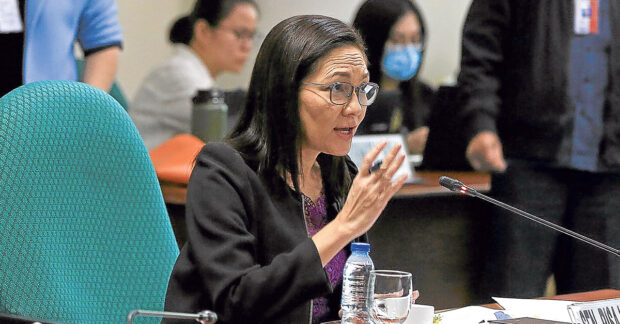
Sen. Risa Hontiveros RICHARD A. REYES
MANILA, Philippines — Senator Risa Hontiveros on Monday evening questioned the “disturbing” contractual award entered into by the Commission on Elections (Comelec) for the 2025 national and local elections.
In a privilege speech, Hontiveros pointed out that Comelec recently awarded a contract for the lease – not the purchase – of vote counting machines for the 2025 polls.
She said with a whopping P18.827 billion approved budget, this contract is the largest in the history of Philippine elections.
“Strangely, the bidding for the richest single contract in Philippine election history was only able to attract a single bidder: a joint venture composed of South Korea’s Miru Systems Co. Ltd., and Philippine companies Integrated Computer Systems, St. Timothy Construction Corp., and Centerpoint Solutions Technologies,” said Hontiveros.
READ: Comelec, Miru ink P17.99 B pact for automated 2025 polls
Controversial Miru Systems
Hontiveros said South Korean firm Miru Systems is no stranger to controversy as it had been involved in various issues surrounding automated elections.
“According to researchers, 30 percent and 75 percent of the voting machines supplied by Miru, respectively, were affected by election-day glitches and malfunctions, which lead to failure of elections in those countries,” she said.
“And while these doubts linger in our minds – doubts caused by electoral troubles in fragile states like the Democratic Republic of Congo and Iraq – it seems that there is also a clear violation of law,” Hontiveros added.
She likewise raised questions on whether or not Miru’s automated counting machines are a prototype.
READ: Miru called out for skipping hearing on new automated poll system
Successfully used systems
Citing Section 12 of Republic Act No. 8436, Hontiveros said the Automated Election Law states that the system procured must have been “successfully used in a prior electoral exercise here or abroad.”
“That’s why many are asking: Does Section 12 of the Automated Election Law prohibit the use of such prototype ACMs in connection with the 2025 elections? If so, why were Miru’s prototype ACMs allowed?” said Hontiveros.
As for the local companies, Hontiveros questioned why a construction company is involved in leasing voting machines for national and local elections.
Was there competitive bidding?
Considering that this was Comelec’s largest single contract to date, Hontiveros wondered why they only attracted a single bid.
“It was confirmed that while five companies – including Dominion Voting Systems, Indra Philippines, Inc., AMA Group Holdings Corp., and Smartmatic – purchased bidding documents, all but Miru declined to submit bids,” said Hontiveros.
The senator asked if “this is real competition” or a mere “competition in the back rooms of the halls of power.”
“This makes me wonder: how many other substantial contracts have been awarded to the lone entity who bothered to submit a bid?” she asked.
Reexamine and reevaluate
Ultimately, Hontiveros emphasized that it might be time to reexamine and reevaluate the country’s legal framework for public procurement. This should prevent the system from getting rigged and manipulated for “private gain,” she said.
“These questions are very important. Not only because public procurement requires the highest duty of care and responsibility from our public servants, but also because – since electoral machines are involved – they strike at the very heart of our democracy,” she stressed.